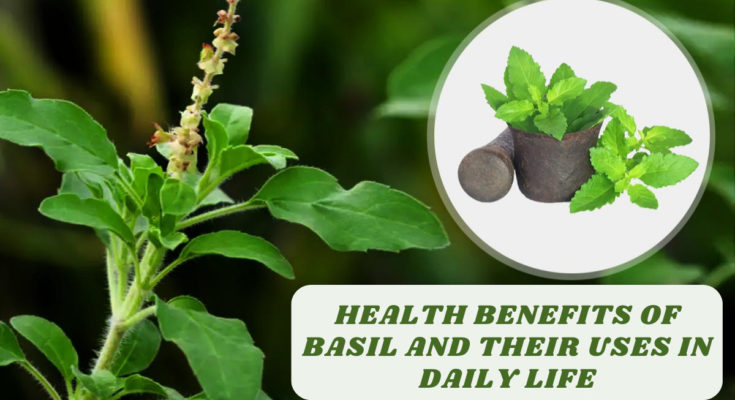BASIL:-
Basil is an aromatic herb that belongs to the mint family. It is widely used in many cuisines around the world, particularly in Italian, Thai, and Vietnamese dishes. Here are some of the benefits of basil:
1. Anti-inflammatory properties: Basil contains essential oils that have anti-inflammatory properties. These oils can help reduce inflammation in the body and may be helpful in conditions such as arthritis.
2. Antioxidant properties: Basil is rich in antioxidants, which help protect the body against damage caused by free radicals. Free radicals are unstable molecules that can damage cells and contribute to the development of chronic diseases.
3. Stress relief: Basil has been traditionally used as a natural remedy for stress and anxiety. Its essential oils are believed to have a calming effect on the mind and body.
4. Digestive health: Basil has been used for centuries to promote digestive health. It can help relieve bloating, gas, and stomach cramps.
5. Immune system support: Basil is a good source of vitamin C, which is important for immune system function. It also contains other immune-boosting compounds such as eugenol, linalool, and citronellol.
6. Oral health: Basil has antibacterial properties that can help reduce the growth of bacteria in the mouth, which may help prevent bad breath, cavities, and gum disease.
TULSI USES :-
Tulsi, also known as holy basil, is an herb that is widely used in traditional Ayurvedic medicine. It is considered to be a sacred plant in Hinduism and is often used in religious ceremonies. Here are some of the common uses of tulsi:
Immune system support: Tulsi is believed to help strengthen the immune system and promote overall health and well-being.
Respiratory health: Tulsi is often used to help relieve respiratory conditions such as coughs, colds, and flu. It has anti-inflammatory and antioxidant properties that can help reduce inflammation and protect against damage caused by free radicals.
Stress relief: Tulsi is known for its adaptogenic properties, which can help the body cope with stress and anxiety. It can also help improve mental clarity and focus.
Oral health: Tulsi has antibacterial properties that can help reduce the growth of bacteria in the mouth. This can help prevent bad breath, cavities, and gum disease.
Skin health: Tulsi has been used topically to help improve the appearance of the skin. It has anti-inflammatory and antimicrobial properties that can help reduce redness and irritation and prevent acne breakouts.
Digestive health: Tulsi can help promote digestive health and relieve digestive issues such as bloating, gas, and indigestion.
Overall, tulsi is a versatile herb that can be used in many different ways to promote health and well-being. It is available in many different forms, including teas, supplements, and essential oils.
WHEN TULSI USED IN DAILY LIFE
Tulsi, also known as holy basil, can be used in many different ways in daily life. Here are some of the common ways people use tulsi:
1. As a tea:
Tulsi tea is a popular beverage in many cultures. It can be made by steeping fresh or dried tulsi leaves in hot water for several minutes. Tulsi tea is believed to have many health benefits, including promoting relaxation, improving digestion, and boosting the immune system.
2. In cooking:
Tulsi is a versatile herb that can be used in many different types of cuisine. It is commonly used in Indian, Thai, and Vietnamese dishes. Tulsi leaves can be used fresh or dried in soups, curries, stir-fries, and salads.
3. In supplements:
Tulsi supplements are available in capsule, tablet, and liquid form. They are often used to help promote overall health and well-being, boost the immune system, and reduce stress and anxiety.
4. As an essential oil:
Tulsi essential oil is extracted from the leaves and stems of the tulsi plant. It is often used in aromatherapy to help promote relaxation, improve mental clarity, and reduce stress and anxiety. It can also be used topically to help improve the appearance of the skin.
5. In religious ceremonies:
Tulsi is considered to be a sacred plant in Hinduism and is often used in religious ceremonies. It is believed to have spiritual and healing properties.
Overall, tulsi is a versatile herb that can be used in many different ways in daily life to promote health and well-being.



